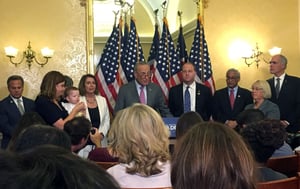 Today, Senator Patty Murray (D-WA) and Congressman Bobby Scott (D-VA) introduced the "Child Care for Working Families Act of 2017." This legislation would greatly assist millions of families in gaining access to quality and affordable care.
Today, Senator Patty Murray (D-WA) and Congressman Bobby Scott (D-VA) introduced the "Child Care for Working Families Act of 2017." This legislation would greatly assist millions of families in gaining access to quality and affordable care.
Child care plays an important role in the economy, helping to generate 15 million jobs and more than $500 billion in income annually. Families need child care so they can work, and children need a safe place where they can learn and continue their healthy development. Unfortunately, far too many families do not have access to high-quality care and cannot afford it due to their limited annual income.
Over the past decade, the cost of child care care has spiked, forcing families to make difficult decisions about investing in care or remaining employed. On a monthly average, millions of working families pay more for child care than they would for a mortgage/rent, transportation needs, or food. In fact, in over 30 states, the cost of care for infants and toddlers exceeds the average cost of tuition at a four-year, in-state college or university. These excessive costs make it extremely difficult for a family to provide for their children while maintaining a decent job.
The Child Care for Working Families Act would ensure that parents and caregivers pay no more than seven percent of their annual income on child care, and families would pay for costs on a sliding scale regardless of the number of children they have. This bill would also support young children with access to universal preschool, and provide robust investment in the compensation and training needs of the child care workforce.
In addition, the Child Care for Working Families Act would:
- Create a federal-state child care partnership for children from birth through age 13.
- More than double the number of children eligible for assistance under the Child Care and Development Block Grant (CCDBG) and ensure these children gain access to high-quality programs.
- Help states create universal preschool programs for three- and four-year olds during the school day, and provide a higher matching rate for infants and toddlers.
- Support the child care workforce through increased training and compensation by ensuring they are paid a living wage.
- Establish provider payment levels that reflect higher wages and provide investment for scholarships.
- Improve the quality of care in home-based, family, and neighbor settings, and during non-traditional working hours to support families.
- Address the functional and access needs of children with disabilities (including infants and toddlers) in child care settings by increasing funding under the Individuals with Disabilities Education Act (IDEA).
- Assist Head Start in providing full-day, full-year programming.
If enacted into law, this bill would provide a "down payment" of over $100 billion in the first three years.
Child Care Aware® of America proudly endorses the Child Care for Working Families Act and commends the leadership of Senator Murray and Congressman Scott. As an organization dedicated to ensuring that all families gain access to high-quality and affordable child care, we believe very strongly that the bill would help ensure parents are able to send their children to type of care they prefer, and that it would be available to suit their schedules, even if it's during the evenings or weekends. Most importantly, the Murray-Scott bill would help prepare more children for school and ensure that the workers who care for them receive the support they need, both in wages and in training.
For more information, check out the Child Care for Working Families Act of 2017 one-pager (pdf).






